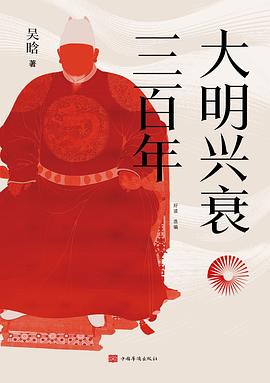
内容简介
明太祖为什么建都南京?
明代的锦衣卫和东西厂是如何形成的?
明代为什么会出现资本主义萌芽?
明朝是亡于“厂卫”“党争”,还是“外族”“流寇”?
明朝是绝对皇权的时代,废丞相制,兴文字狱,建锦衣卫,设东西厂,中央集权发展到顶峰;然而,明朝又是商品经济比较发达的阶段,出现了被后世称为“资本主义萌芽”的经济繁荣现象。这个王朝在中国历史上究竟是怎样的独特存在?
翻开本书,让我们跟随历史大家吴晗一窥大明王朝的真实面貌,了解其因何而兴,因何而亡。
作者简介
吴晗
中国著名历史学家,现代明史研究的开拓者和奠基者之一。
早年考入中国公学,成为胡适门生,于史学初露锋芒,深受赏识;后入清华专攻明史,在大学期间写下四十多篇论述,颇受当时史界名流青睐;大学毕业后,留校讲授明史。
代表作有《朱元璋传》《历史的镜子》等。
Content introduction
Why was Nanjing the capital of Emperor Taizu?
How did Jinyi Wei and East and West factories come into being in the Ming Dynasty?
Why did capitalism sprout in Ming Dynasty?
Did the Ming Dynasty die from "factory" and "party struggle", or "foreign" and "roving rebels"?
Ming Dynasty is the era of absolute imperial power, abolish the prime minister system, xing literary prison, build jinyiwei, set up east and west factories, centralized development to the peak; However, the Ming Dynasty was also a relatively developed stage of commodity economy, which was called "the germination of capitalism". What is the unique existence of this dynasty in Chinese history?
Open this book, let us follow the history master Wu Han to see the true face of the Ming Dynasty, understand why it rose, why it died.
About the author
Wu Han
He is a famous Chinese historian and one of the pioneers and founders of modern Ming history research.
In his early years, he was admitted to the Chinese Public School and became a protege of Hu Shi. Later, he majored in Ming history at Tsinghua University and wrote more than 40 essays during his university years, which was favored by celebrities in the history circle at that time. After graduating from university, he stayed in school to teach Ming history.
His representative works include Biography of Zhu Yuanzhang and Mirror of History.
 热门标签
热门标签












 书单推荐
书单推荐